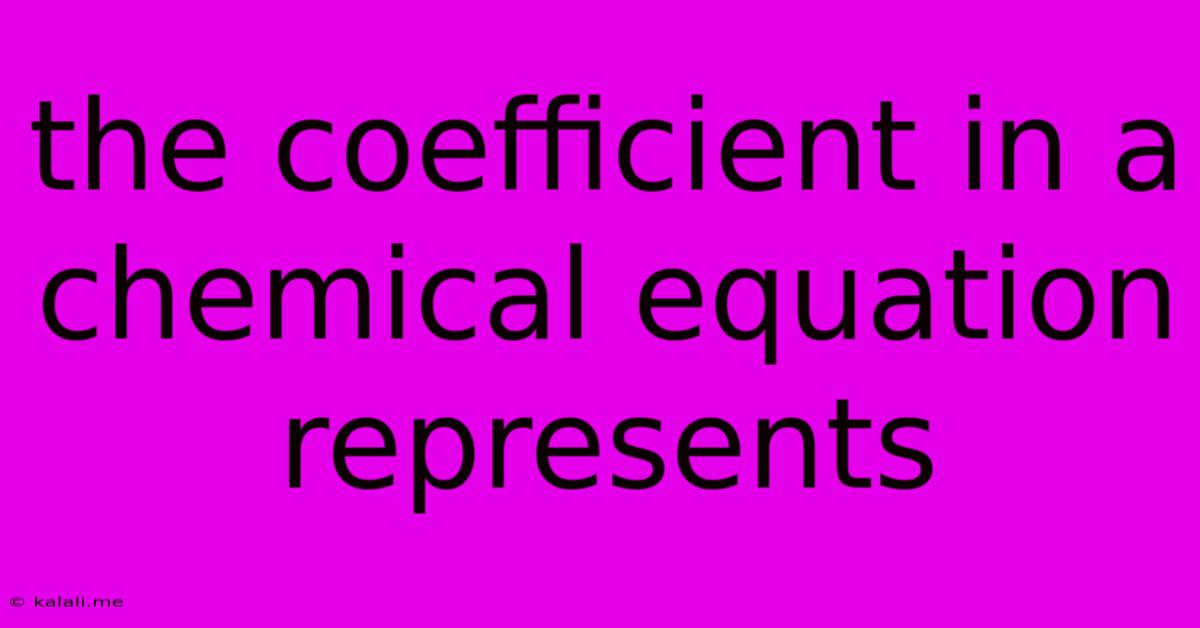The Coefficient In A Chemical Equation Represents
Kalali
May 10, 2025 · 3 min read

Table of Contents
The Coefficient in a Chemical Equation: A Comprehensive Guide
Meta Description: Understanding coefficients in chemical equations is crucial for mastering stoichiometry. This guide explains what coefficients represent, how to balance equations, and their importance in chemical calculations.
Chemical equations are the shorthand notation chemists use to describe chemical reactions. They show the reactants (starting materials) transforming into products (resulting substances). A crucial part of understanding these equations lies in grasping the meaning and significance of the coefficients present. This article will delve into what coefficients represent in a chemical equation and their importance in various chemical calculations.
What do Coefficients Represent?
Coefficients are the numerical values placed in front of the chemical formulas in a balanced chemical equation. They represent the relative number of moles of each reactant and product involved in the reaction. It's crucial to remember that these coefficients represent ratios, not absolute quantities. You can think of them as scaling factors for the entire reaction.
For example, consider the balanced equation for the combustion of methane:
CH₄ + 2O₂ → CO₂ + 2H₂O
In this equation:
- The coefficient of 1 (implied) in front of CH₄ indicates one mole of methane is reacting.
- The coefficient of 2 in front of O₂ indicates two moles of oxygen gas are reacting.
- The coefficient of 1 (implied) in front of CO₂ indicates one mole of carbon dioxide is produced.
- The coefficient of 2 in front of H₂O indicates two moles of water are produced.
This means that for every one mole of methane reacting with two moles of oxygen, one mole of carbon dioxide and two moles of water are produced. The ratio of reactants to products is 1:2:1:2. This ratio remains constant, regardless of the actual amounts of reactants used.
Balancing Chemical Equations and the Role of Coefficients
Balancing a chemical equation is essential because it reflects the law of conservation of mass. This law states that matter cannot be created or destroyed in a chemical reaction; only rearranged. Therefore, the number of atoms of each element must be the same on both the reactant and product sides of the equation. Coefficients are adjusted to achieve this balance.
Balancing equations involves a trial-and-error process, often starting with the most complex molecule. It's important to change only the coefficients, never the subscripts within the chemical formulas themselves. Changing subscripts alters the chemical identity of the substance.
Importance of Coefficients in Stoichiometric Calculations
Coefficients are fundamental to stoichiometry, the quantitative study of chemical reactions. They allow us to calculate:
- Molar ratios: The coefficients directly provide the molar ratios between reactants and products. This is critical for determining the amount of product formed from a given amount of reactant (or vice versa).
- Limiting reactants: By comparing the molar ratios of reactants to their actual amounts, we can identify the limiting reactant—the reactant that is completely consumed first and limits the amount of product formed.
- Theoretical yield: Using the stoichiometric ratios, we can calculate the theoretical maximum amount of product that can be formed under ideal conditions.
- Percent yield: The actual yield of a reaction (experimentally determined) can be compared to the theoretical yield to calculate the percent yield, indicating the efficiency of the reaction.
In Summary
Coefficients in chemical equations are essential tools for understanding and quantifying chemical reactions. They represent the relative molar ratios of reactants and products, ensuring the conservation of mass. Mastering the concept of coefficients is paramount for successful stoichiometric calculations and a deeper understanding of chemical processes. Understanding their role in balancing equations and subsequent calculations is a cornerstone of chemistry.
Latest Posts
Latest Posts
-
700 Is 10 Times As Much As
Jul 12, 2025
-
How Much Is 120 Kilograms In Pounds
Jul 12, 2025
-
Born In 1990 How Old Am I
Jul 12, 2025
-
What Is The Average Iq For A 5 Year Old
Jul 12, 2025
-
How Many 12 Oz Cups In A Gallon
Jul 12, 2025
Related Post
Thank you for visiting our website which covers about The Coefficient In A Chemical Equation Represents . We hope the information provided has been useful to you. Feel free to contact us if you have any questions or need further assistance. See you next time and don't miss to bookmark.